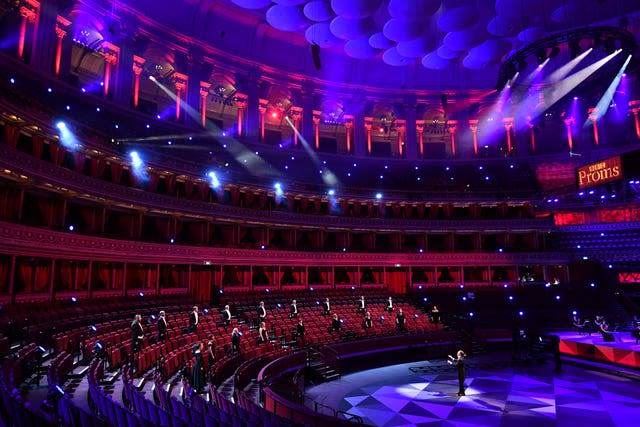Ex-director of BBC Singers on proposed cuts: They are chasing ratings
The former director of the BBC Singers has criticised the corporation’s proposed cuts to classical music performing groups, claiming the broadcaster wants to “chase on the coat tails of Netflix or Amazon”.
Paul Hughes, who stepped down last summer after 23 years at the BBC, said he was “speechless” the corporation plans to scrap its in-house chamber choir, the BBC Singers, and reduce salaried orchestral posts across the BBC English Orchestras by around 20%.
The decision to close the BBC Singers would result in the loss of 20 posts, the broadcaster previously confirmed.
The BBC said the plans follow a 2022 review looking at the classical sector and its role within it – and forms part of a new strategy for classical music which “prioritises quality, agility and impact”.
“I don’t know what public service means in the BBC context now. If the BBC is not to do that which others can’t do, what are they for?" Paul Hughes, fmr dir of the BBC Symphony Orchestra and Chorus and @BBCSingers on wide-ranging BBC cuts. Listen now:https://t.co/D8LuIHqlny pic.twitter.com/mhfqKTI0Bb
— RogerBoltonsBeebWatch (@BeebRoger) March 9, 2023
Mr Hughes, also the former director of the BBC Symphony Orchestra, told the Roger Bolton’s Beeb Watch podcast: “The consultation was undertaken and led by people who know nothing about the classical music world, reporting up to people who know nothing about the classical music world.
“It’s been quite clear for a good number of years now how little the BBC values classical music and values its orchestras.
“Apart from the work we do within the Proms, there’s almost no marketing support, no profile, no pride shown, no reward given, no valuing of the work that they do day in and day out.
“And yet still the musicians do it to an astonishingly high level and that’s not appreciated.”
He later said: “I spent 23 years of my life building something up and I’m angrier than I can say at watching it being dismantled and unpicked so casually.”
The BBC previously said that the move was part of a plan “to invest more widely in the future of choral singing across the UK” and launch a choral development programme for new talent.

It also said it aimed to create “agile ensembles” that can work with “more musicians and broadcasting from more venues – up to 50 – in different parts of the country”.
Those working across three English Orchestras – Symphony, Concert and Philharmonic – will be offered a voluntary redundancy programme to reach the 20% target, it said.
On the podcast, Mr Hughes said: “I left at just the right time for me and I am absolutely heartbroken for those people who are still there and struggling through this.”
The former director said he started to feel “completely out of sync with the culture” at the BBC, describing it as “not a pleasant place to work”.
He later questioned what the proposed cuts meant in relation to the BBC’s public service remit.
“If the BBC is not to do that which others can’t do, what are they for? I really don’t understand what they’re for,” he said.
“It just seems to be about chasing ratings. They want to chase on the coat tails of Netflix or Amazon although they say they don’t, but clearly that’s what the BBC has become.
“For all the years that I was there, I remember every time the licence fee renewal came around, the BBC Performing Groups were trotted out as being the epitome of public service broadcasting… and then we’re put back in a drawer at the end of it until the next time.”
Mr Hughes was particularly upset about the circumstances surrounding proposed plans to close the BBC Singers, describing it as “extremely unpleasant”.
He added: “To cut the BBC Singers on the eve of their centenary, to do it at such speed, to deny them an appearance even in the Proms. I mean that is vicious.”

The BBC confirmed it is in “close consultation” with the Musicians Union (MU), which represents more than 30,000 members working across the sector, on all of the plans.
A spokesperson for the BBC said: “Since 1922, the BBC has been an integral part of the classical music ecology in this country and abroad.
“For us to continue to be a leading force in the industry we need to modernise, making some necessary and difficult changes to the way we operate, to ensure we are responding to audience needs and providing the best possible music to the widest possible audience.
“Many models have been considered over the past few months, this new classical strategy increases our flexibility and reach, improves our education offer and provides better value to the licence fee payer.
“The new strategy is ambitious and will, at its heart, improve impact and access to classical music for all, whilst reducing cost.”

Mr Hughes’ comments come after Labour urged the Government to support calls for the BBC to reconsider the “devastating and damaging” proposed cuts.
Shadow culture minister Barbara Keeley told the Commons on Thursday: “The cost-of-living crisis appears to have caused the BBC to announce that some of the finest musicians in the world will lose their jobs.
“The BBC’s new strategy for classical music plans to deliver savings by axing the world-famous BBC Singers, the only full-time professional choir in the UK and making 20% redundancies in all BBC orchestras.
“I urge the minister and the Secretary of State to support the call on the BBC to reconsider this devastating and damaging decision to disband the BBC Singers and make 20% of jobs redundant in all its orchestras?”
The BBC’s new strategy also includes doubling funding for music education and launching new training initiatives, and creating a single digital home for its orchestras.
The broadcaster previously confirmed that due to a freeze in the licence fee and inflation it faces a £400 million funding gap by 2026/2027 and must make savings.
Last year, it announced hundreds of job cuts to its news service.
Tim Davie, who took over from Lord Tony Hall as director-general in September 2020, has overseen a slimming down of the corporation since starting in the role.

 Yahoo News
Yahoo News 
